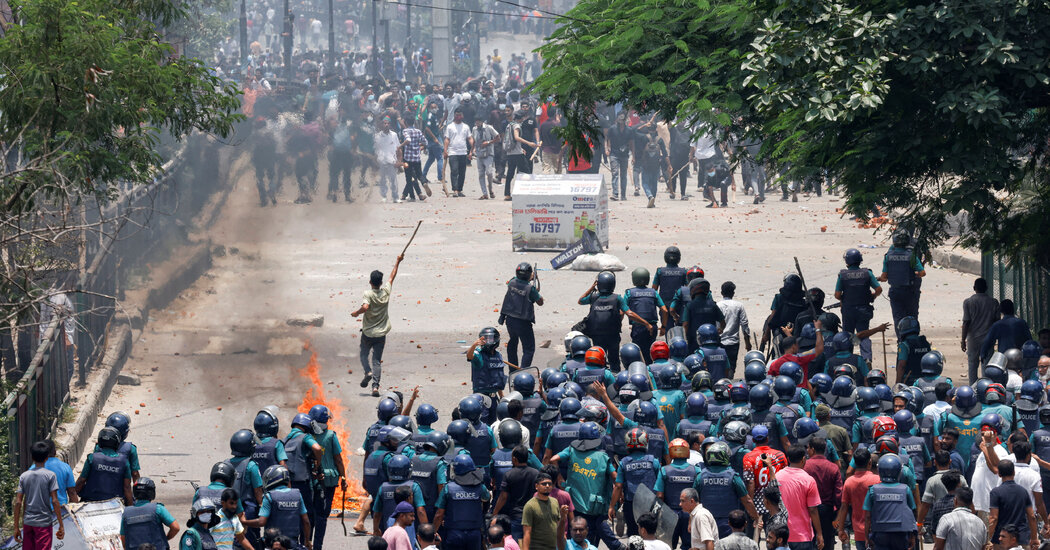Prime Minister Sheikh Hasina of Bangladesh resigned on Monday as protests that began as peaceful demonstrations by students grew into a broader movement calling for an end to her increasingly authoritarian leadership of the nation.
Ms. Hasina deployed the police and paramilitary forces against the students late last month, a crackdown that set off broader public anger against her. The protests became increasingly violent as more students as well as other citizens joined, clashing with pro-government supporters and the authorities.
More than 300 people have been killed. After a curfew and communication blackout eased, the revival of the protests over the weekend, in addition to a call by Ms. Hasina’s party for its own supporters to take to the streets, plunged Bangladesh into a particularly dangerous phase.
On Monday, the army chief announced the resignation and said an interim government would be formed.
Here’s what to know about the protests.
What were the protests about?
Students at the University of Dhaka, the country’s top institution, started the demonstrations on July 1, and they later spread to other elite universities, and then to the general public. The protests turned violent when some members of student wing of the governing party, the Awami League, began attacking the protesters.
Besides sending the police and paramilitaries into the streets, the government locked down schools and colleges. Officials said they slowed down internet connectivity to stop the spread of rumors and protect citizens, making it harder for protesters to organize and make plans via social media platforms.
The protests were initially about coveted government jobs and who is entitled to them. An old quota system, reinstated recently by the courts, reserves more than half of those jobs for various groups, including the families of those who fought for independence from Pakistan. The students said that the system is unfair and that most of the positions should be filled based on merit.
In the past couple of weeks, however, the movement grew massively and become centered on calling for accountability for Ms. Hasina’s increasingly harsh governance.
How did the protests evolve?
The crackdown in late July, which saw over 200 people killed and 10,000 arrested, temporarily dispersed the protesters. However, the large number of deaths also fueled protesters’ anger.
Over the weekend, the tensions spread away from protests and into clashes across the country that appeared difficult to contain. On Saturday at a rally of tens of thousands, protesters called for the resignation of Ms. Hasina, who has been in power for the past 15 years.
In response, Ms. Hasina’s Awami League party called on its supporters to join counter protests, and she asked the country’s people “to curb anarchists with iron hands.”
The threat emboldened protesters, who called for a march on her residence in central Dhaka on Monday. The government once again imposed a curfew, effectively shutting the country down.
By midafternoon Monday in Dhaka, what appeared to be conditions for another deadly day of protests had eased. Police officers let protesters cross barricades into the center of the city, and the army said they would make a statement.
Shortly after, the army chief announced that Ms. Hasina had left the country.
What will happen to Bangladesh after her ouster?
Ms. Hasina was among the world’s longest-serving female heads of government, a secular Muslim who fought Islamic militancy, helped lift millions out of poverty and deftly kept both India and China at her side.
Over the past 15 years, Ms. Hasina entrenched her authority and divided Bangladesh, a nation of 170 million people. Those who were loyal were rewarded with patronage, power and impunity. Dissenters were met with crackdowns, endless legal entanglement and imprisonment.
The army has asked the president, who holds a ceremonial role, to form a new government. Bangladesh’s army has a history of staging coups and counter coups. But over the past couple decades, the military has taken a less overt role in public affairs, choosing more often to exercise influence from behind the scenes.
